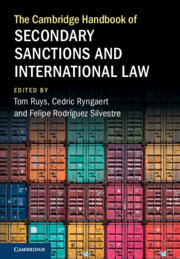Book contents
- The Cambridge Handbook of Secondary Sanctions and International Law
- The Cambridge Handbook of Secondary Sanctions and International Law
- Copyright page
- Contents
- Figures
- Contributors
- 1 Introduction
- Part I Secondary Sanctions
- Part II Secondary Sanctions and General Public International Law
- Part III Secondary Sanctions and International Economic Law
- 11 Secondary Economic Sanctions
- 12 Secondary Sanctions under International Investment Law
- 13 The Enforcement of Extraterritorial Sanctions
- 14 Secondary Sanctions under General and Security Exceptions
- Part IV Secondary Sanctions in Commercial Practices and Domestic Litigation
- Part V The Future of Secondary Sanctions
- Index
13 - The Enforcement of Extraterritorial Sanctions
Asset Freezes and International Monetary Law
from Part III - Secondary Sanctions and International Economic Law
Published online by Cambridge University Press: 14 December 2024
- The Cambridge Handbook of Secondary Sanctions and International Law
- The Cambridge Handbook of Secondary Sanctions and International Law
- Copyright page
- Contents
- Figures
- Contributors
- 1 Introduction
- Part I Secondary Sanctions
- Part II Secondary Sanctions and General Public International Law
- Part III Secondary Sanctions and International Economic Law
- 11 Secondary Economic Sanctions
- 12 Secondary Sanctions under International Investment Law
- 13 The Enforcement of Extraterritorial Sanctions
- 14 Secondary Sanctions under General and Security Exceptions
- Part IV Secondary Sanctions in Commercial Practices and Domestic Litigation
- Part V The Future of Secondary Sanctions
- Index
Summary
The chapter assesses whether the enforcement of extraterritorial sanctions through asset freezes is consistent with customary and treaty rules of international monetary law. After defining key concepts and describing the main characteristics of asset freezes, a definition of such measures through the lenses of international monetary law is provided. The research then moves, first, to discuss whether the imposition of asset freezes to enforce extraterritorial sanctions regimes can be deemed an exercise of internal or external monetary sovereignty and, second, whether unilateral (extraterritorial) sanctions can be considered to amount to exchange restrictions legitimately introduced for security reasons for the purposes of the Articles of Agreement of the International Monetary Fund (IMF). The chapter concludes with a critical assessment of the IMF legal regime on unilateral (extraterritorial) sanctions.
Keywords
- Type
- Chapter
- Information
- Publisher: Cambridge University PressPrint publication year: 2024

